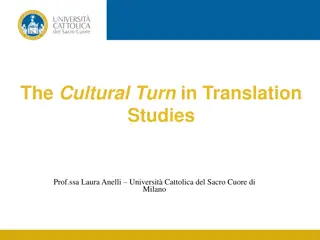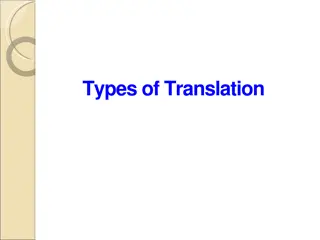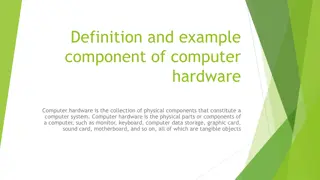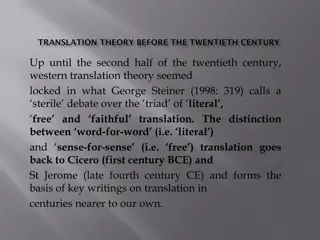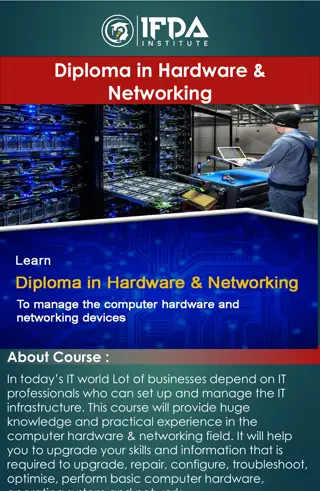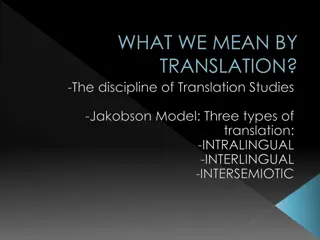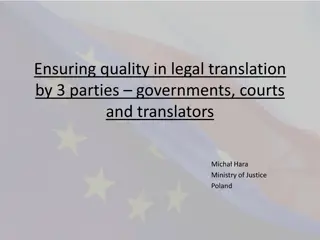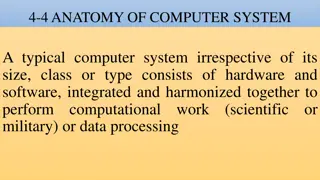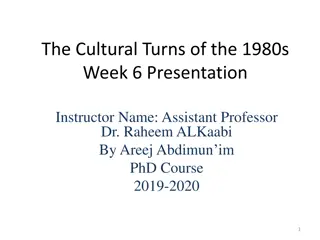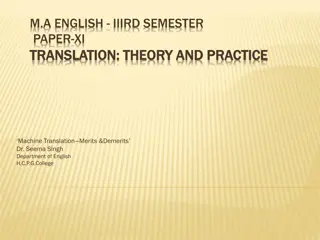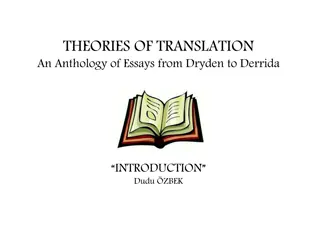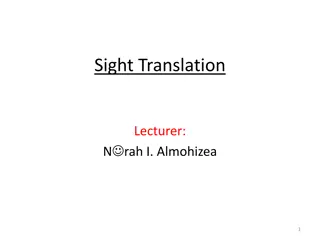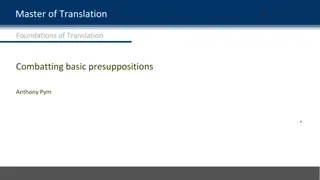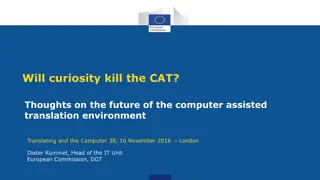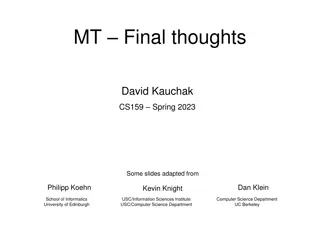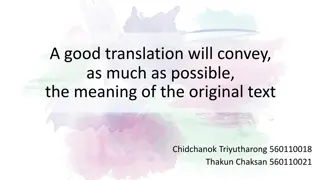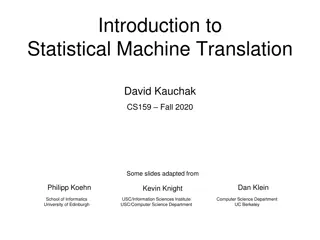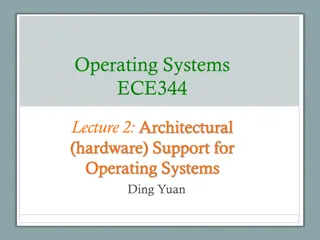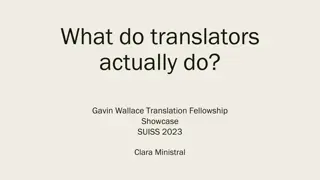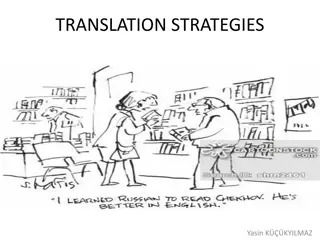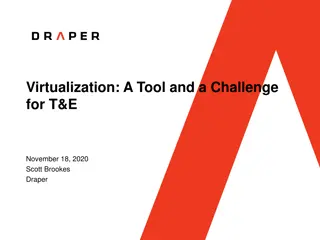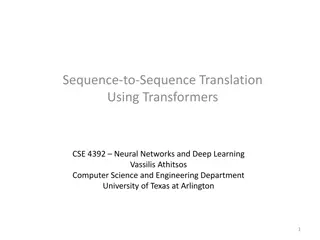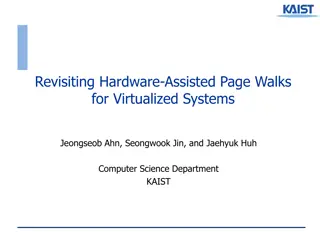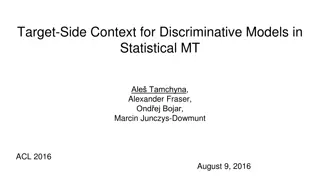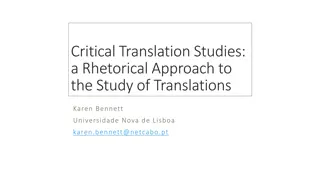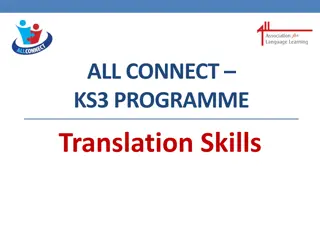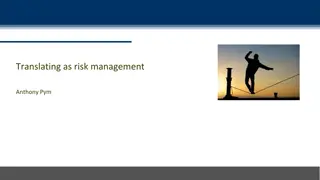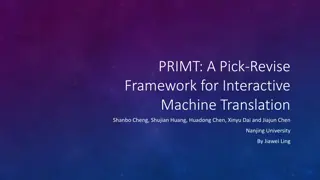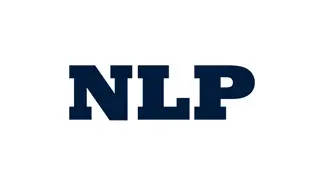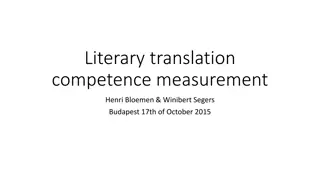Understanding Computer Organization and Architecture
A computer system is a programmable digital electronics device that processes data as per program instructions to provide meaningful output. It comprises hardware and software components, with hardware being the physical parts and software essential for driving the hardware. Computer organization fo
14 views • 71 slides
Christian Translation
Understand the Christian language perfectly with the help of Christian Lingua's Christian Translation services. Christian lingua is one of the perfect Christian translation ministries offering premium Christian translation services. We always provide high-quality Christian translation services to ma
2 views • 5 slides
Understanding Translation: Key Concepts and Definitions
Translation involves transferring written text from one language to another, while interpreting deals with oral communication. Etymologically, the term "translation" comes from Latin meaning "to carry over." It is a process of replacing an original text with another in a different language. Translat
11 views • 76 slides
Hold Down and Release Mechanism Hardware Simulator for Ground Deployment Testing
The project involves developing a hardware simulator for testing a Hold Down and Release Mechanism used in Mars Sample Return missions. The simulator aims to replicate the functionality of expensive flight hardware at a lower cost and with reduced lead time. Key requirements include precise activati
3 views • 8 slides
Understanding Translation Studies: From Origins to Cultural Turn
The exploration of translation studies, from its historical roots to the modern cultural turn, delves into the essence of translation, its typologies according to Jakobson, the role of translators through historical perspectives from Cicero to modern times, and insights from Dryden and Schleiermache
2 views • 38 slides
Exploring Different Types of Translation
Discover various types of translation including oral, written, computer-assisted, machine translation, and back translation. Learn about the processes involved in each type and how they facilitate communication across different language cultures. Gain insights into the intricacies of translating spo
1 views • 18 slides
Overview of Computer Hardware Components and Software Functions
Computer hardware components such as monitor, CPU, mouse, and projector are essential physical parts of a computer system, while software includes intangible programs like operating systems and utility software. Hardware components perform tasks like displaying data, processing information, and prin
8 views • 9 slides
Essentials of Literary Translation: Understanding the Art and Skill of Interpreting
The process of literary translation involves creativity, cultural understanding, and maintaining the essence of the original text. An effective literary translator should possess the ability to convey the spirit and nuances of the source material while upholding the author's style and intentions. Av
0 views • 25 slides
Evolution of Translation Theory: From Literal to Sense-for-Sense
Western translation theory up to the 20th century revolved around the debate of literal, free, and faithful translation. This discussion traces back to Cicero and St. Jerome and has influenced translation practices for centuries. While some advocated for word-for-word translations, others, like St.
1 views • 13 slides
Diploma in Hardware & Networking: Upgrade Your IT Skills
This course provides comprehensive knowledge and practical experience in computer hardware and networking, essential for managing IT infrastructure. Gain expertise in PC hardware maintenance, customer and networking support, and more to pursue a career as a Hardware and Network Engineer. Learn to as
1 views • 8 slides
Evolution of Translation Studies: From Ancient Practices to Modern Specializations
Translation studies have evolved into a new discipline focusing on intralingual, interlingual, and intersemiotic translation. Starting with historical figures like Cicero and Jerome, the discipline has now expanded into specialized areas such as scientific, technical, and audiovisual translation pro
0 views • 15 slides
Ensuring Quality in Legal Translation by 3 Parties: Governments, Courts, and Translators
Explore the importance of quality legal translation involving governments, courts, and translators in criminal proceedings. The European Union's Directive on interpretation and translation aims to facilitate communication across Member States. Governments play a key role in regulating the translatio
0 views • 20 slides
Anatomy of a Computer System: Hardware Components and Functions
A typical computer system consists of hardware and software working together to perform various computational tasks. The hardware components include the central processing unit (CPU), input/output devices, storage units, and the motherboard. The CPU acts as the main brain of the computer, performing
6 views • 6 slides
The Cultural Turns of the 1980s in Translation Studies
This presentation explores the various cultural turns in Translation Studies during the 1980s, highlighting key scholars such as Snell-Hornby and Even-Zohar. It discusses the linguistic turn, pragmatic turn, and the significance of cultural studies in understanding translation processes, particularl
0 views • 30 slides
Redesigning the GPU Memory Hierarchy for Multi-Application Concurrency
This presentation delves into the innovative reimagining of GPU memory hierarchy to accommodate multiple applications concurrently. It explores the challenges of GPU sharing with address translation, high-latency page walks, and inefficient caching, offering insights into a translation-aware memory
1 views • 15 slides
Machine Translation: Merits and Demerits
Machine translation, also known as Computer Aided Translation, has revolutionized the way we translate languages. Starting from its simple inception in 1933 to the advanced software programs of the 21st century, machine translation has many advantages such as saving time, cost-effectiveness, and bet
1 views • 6 slides
Overview of Translation Theories from Dryden to Derrida
The introduction of "Theories of Translation: An Anthology of Essays from Dryden to Derrida" offers a historical insight into translation theories. John Dryden emphasizes the importance of being proficient in both languages for translation. He categorizes translation into three types: metaphrase, pa
2 views • 25 slides
Exploring Translation Techniques and Levels
Delve into various translation techniques such as amplification, false friends, explicitation, and generalization, as exemplified by Vinay and Darbelnet. Discover the concept of loss, gain, and compensation in translation, along with the different levels of translation, including lexicon, syntactic
0 views • 16 slides
Translation Strategies and Equivalence Models in Modern Translation Studies
In modern translation studies, the concept of equivalence and different translation strategies are explored. Scholars have debated the subjectivity involved in translation, with some advocating for a descriptive approach while others stick to prescriptive discussions of equivalence. Influenced by pa
0 views • 10 slides
Seminar on Truth, Trust, and Cooperation in Translation Ethics
Dive into the complexities of translation ethics by exploring concepts from Berman's textual ethics and Pym's ethics in the context of real-world translation practices. Reflect on the genre-dependent nature of ethics in translation and contemplate the translator's role in today's multicultural lands
1 views • 26 slides
Mastering Sight Translation: Techniques and Best Practices
Sight translation involves transforming text from a source language into a target language orally. The process includes reading for comprehension, identifying main points, addressing potential issues, and segmenting text effectively for oral translation. Practice these steps to improve your sight tr
0 views • 15 slides
Exploring Foundations of Translation: Combatting Presuppositions
Delve into the world of translation with a focus on combatting basic presuppositions. Explore different aims in translation, understand prescriptivism versus descriptivism, and discover key concepts in Translation Studies from the 1960s to today. Learn about the Skopostheorie, empirical disciplines,
0 views • 15 slides
The Future of Computer-Assisted Translation: Insights and Trends
Delve into the evolving landscape of computer-assisted translation (CAT) tools and technologies as discussed by Dieter Rummel, the Head of the IT Unit at the European Commission. Explore the impact of curiosity on CAT advancements, trends shaping translation environments, and the shifting dynamics i
0 views • 25 slides
Insights on Machine Translation and Evaluation Techniques
Delve into the world of machine translation with a focus on evaluation techniques such as word alignment and translation models. Explore the nuances of different models and methodologies to quantify the quality of translations in various languages. Gain a deeper understanding of how precision and re
0 views • 51 slides
Mastering the Art of Good Translation: Key Principles and Techniques
Understanding the essence of translation, its characteristics, and the methods to ensure an accurate conveyance of meaning. Exploring different types of translation and emphasizing the importance of naturalness, clarity, and accuracy in the translation process. Utilizing semantic and communicative s
0 views • 31 slides
Introduction to Statistical Machine Translation CS159 Fall 2020
This presentation covers various aspects of Statistical Machine Translation, including levels of transfer, data-driven approaches, and the challenges involved. It discusses examples such as maintaining alert levels in response to threats, translating Chinese texts using bilingual data, and even a fu
1 views • 41 slides
Architectural Hardware Support for Operating Systems in ECE344 Lecture
The lecture discusses the importance of hardware support in operating systems, emphasizing the management of hardware resources and providing a clear interface to programs. It explores the fundamental relationship between operating system functionality and hardware, highlighting how hardware support
0 views • 53 slides
Understanding Address Translation in Computer Systems
Explore the concept of address translation in computer systems, covering topics such as converting virtual addresses to physical addresses, different translation methods, goals of address translation, bonus features, and a preview of MIPS address translation. Learn about the benefits and limitations
0 views • 60 slides
Unveiling the World of Translators: Gavin Wallace Translation Fellowship Showcase at SUISS 2023
Exploring the intricate world of translators at the Gavin Wallace Translation Fellowship Showcase, where Clara Ministral dives into the essence of translation. From unraveling the enigmatic "The Beholder" by Ali Smith to navigating personal struggles and language nuances, the journey of a translator
1 views • 12 slides
Translation Strategies and Principles for Effective Communication
This content covers features and principles of good translation, problems encountered in translation such as lexical and syntactic issues, degrees of approximation, typologies of translation strategies, and the significance of syntactic, semantic, and pragmatic components in translation. It also dis
0 views • 29 slides
Understanding Virtualization: Hardware Abstraction and Hypervisor Concepts
Dive into the world of virtualization with a focus on hardware abstraction and hypervisor technology. Explore the definitions and examples of hardware virtualization, hypervisors, and hardware abstraction, shedding light on how they enable multiple operating systems to coexist on a single physical m
0 views • 21 slides
Transformer Neural Networks for Sequence-to-Sequence Translation
In the domain of neural networks, the Transformer architecture has revolutionized sequence-to-sequence translation tasks. This involves attention mechanisms, multi-head attention, transformer encoder layers, and positional embeddings to enhance the translation process. Additionally, Encoder-Decoder
0 views • 24 slides
Hardware-Assisted Page Walks for Virtualized Systems
Virtualization in cloud computing and server consolidation relies on hardware-assisted page walks for address translation in virtualized systems. This involves two-level address translations to ensure isolated address spaces for each virtual machine, utilizing multi-level page tables to manage memor
0 views • 32 slides
Importance of Context in Statistical Machine Translation
Understanding the significance of context in machine translation is crucial for improving accuracy and disambiguating word sense. This research delves into the impact of target-side context for discriminative models in statistical machine translation, showcasing how context influences model performa
0 views • 29 slides
Rhetorical Approach to Translation Studies: Challenges and Perspectives
This study explores the emergence of a rhetorical approach in Translation Studies, aiming to counter empiricism and highlight the importance of subjectivity and interpretation in translation. By examining paradigms in Translation Studies, it contrasts the scientistic drive for objectivity with a hum
0 views • 34 slides
Enhancing Translation Skills in Key Stage 3 Language Learning
Explore the fundamentals of translation in language education for Key Stage 3 students. Learn the importance of translation, practical strategies, and curriculum alignment. Set objectives to develop student translation skills effectively through interactive practices and comprehensive planning.
0 views • 35 slides
Translation Strategies for Risk Management in Multilingual Contexts
Managing risks in translation involves navigating pedagogical challenges, decision-making frameworks like Skopos, and choosing appropriate translation workflows based on the stakes involved. Mistakes can occur in critical documents like birth certificates or in translating important information, suc
0 views • 20 slides
PRIMT: A Pick-Revise Framework for Interactive Machine Translation
Interactive Machine Translation (IMT) presents a solution to enhance translation quality by involving human interaction at critical stages. The Pick-Revise framework allows users to pick and revise translation errors, improving overall accuracy and efficiency. By integrating automatic suggestion mod
0 views • 23 slides
Machine Translation: Techniques and Challenges
Explore the world of machine translation as it evolves from basic techniques to advanced systems like Systran and Google Translate. Delve into the concept of translation as decoding and the challenges faced in automatic translations, as exemplified in a recipe translation from English to French by G
0 views • 16 slides
Understanding Competence Measurement in Literary Translation
Exploring the concept of competence measurement in literary translation, this text delves into the ELV competence model, a five-step scheme for measurement, reliability versus validity, and the relationship between competence measurement and translation product evaluation. It discusses the importanc
0 views • 18 slides




